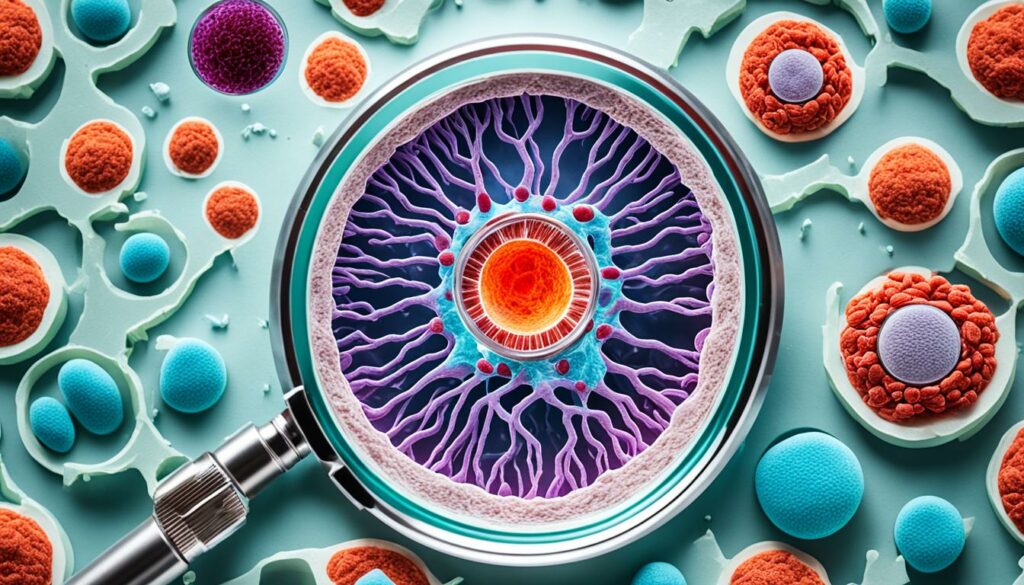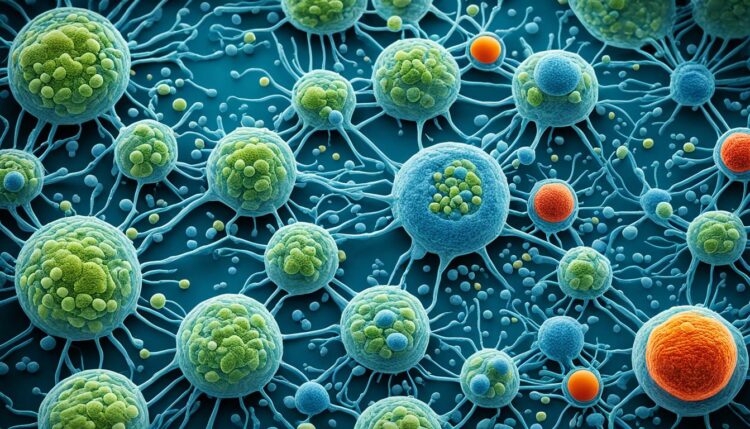Did you know that autophagy, the natural cellular process of breaking down and recycling damaged components, holds the key to unlocking a multitude of health benefits?
This fascinating mechanism is not only crucial for maintaining cellular health but also has the potential to enhance immune function, regulate inflammation, promote cellular rejuvenation, and even contribute to longevity.
So, let’s delve into the definition, process, mechanism, and ongoing research behind autophagy to uncover its secrets and harness its potential for enhancing our health.
Key Takeaways:
- Autophagy is a natural cellular process in which damaged or dysfunctional components are broken down and recycled.
- Understanding autophagy is crucial to exploring its potential benefits for health and well-being.
- Autophagy plays a role in cellular rejuvenation, clearance of toxic substances, immune function, inflammation regulation, and energy production.
- Methods such as caloric restriction, intermittent fasting, exercise, and specific dietary patterns can stimulate autophagy.
- Ongoing research on autophagy aims to uncover its mechanisms and implications for various diseases and conditions.
What is Autophagy and Why is it Important?
Autophagy, derived from the Greek word meaning “self-eating,” is a vital cellular mechanism that involves the breakdown and recycling of damaged or dysfunctional components within the body’s cells. This natural process plays a crucial role in maintaining cellular health and promoting overall well-being.
Through autophagy, cells are able to remove and recycle cellular waste, allowing for rejuvenation and optimal function. By targeting and eliminating these unwanted components, autophagy serves as a quality control system for cells, promoting their longevity and vitality.
Understanding the definition and process of autophagy is essential as it sheds light on the significance of this cellular mechanism in maintaining health. By embracing autophagy, individuals can harness its benefits for enhanced well-being.
A central role of autophagy is to maintain cellular health by removing and recycling damaged components within cells. This process is crucial for overall well-being and longevity.
| Benefits of Autophagy | Impact on Health |
|---|---|
| 1. Cellular rejuvenation | 1. Enhanced cellular function and vitality |
| 2. Clearance of toxic substances | 2. Reduced cellular damage and risk of disease |
| 3. Regulation of inflammation | 3. Improved immune function and response |
| 4. Cellular metabolism and energy production | 4. Increased metabolic flexibility and energy levels |
| 5. Potential implications for longevity |
The Benefits of Autophagy and Its Impact on Health
Autophagy, a natural cellular process, offers numerous benefits for overall health. Understanding these benefits can help individuals harness the potential of autophagy to enhance their well-being.
“Autophagy is a cellular housekeeping process that allows cells to remove and recycle damaged components, promoting cellular rejuvenation and maintaining vitality.”
One of the key benefits of autophagy is its role in cellular rejuvenation. By eliminating damaged components and recycling them, autophagy helps cells maintain their optimal function. This process contributes to the overall health and vitality of cells, supporting their ability to carry out essential tasks and respond effectively to various stimuli.
Moreover, autophagy plays a crucial role in clearing toxic substances from cells. It targets misfolded and aggregated proteins, reducing the risk of cellular damage and dysfunction. By removing these harmful substances, autophagy helps maintain cellular homeostasis and supports overall cellular health.
In addition to its role in eliminating cellular waste, autophagy is closely linked to immune function. It facilitates the clearance of intracellular pathogens, aiding in the body’s defense against infections. Furthermore, autophagy helps regulate inflammation, a critical process for immune response and overall health.
Autophagy also supports cellular metabolism and energy production. By recycling cellular components, autophagy contributes to metabolic flexibility, allowing cells to adapt to changing energy demands. This process plays a vital role in maintaining systemic energy balance and overall metabolic health.
Research suggests that autophagy may have implications for healthy aging and longevity. Studies have shown that promoting autophagy can help counteract age-related cellular dysfunction and contribute to healthier aging processes.
By enhancing cellular rejuvenation, clearing toxic substances, supporting immune function, and maintaining metabolic flexibility, autophagy has the potential to positively impact overall health and well-being.
Autophagy Benefits
| Benefits of Autophagy | Impact on Health |
|---|---|
| Cellular Rejuvenation | Enhances cellular function and vitality |
| Clearance of Toxic Substances | Reduces the risk of cellular damage and dysfunction |
| Immune Function | Aids in clearing intracellular pathogens and regulating inflammation |
| Cellular Metabolism | Supports metabolic flexibility and energy production |
| Aging and Longevity | May have implications for healthy aging and longevity |
Understanding the benefits of autophagy empowers individuals to make lifestyle choices that promote this cellular process, ultimately enhancing their overall health and well-being.

Ways to Induce Autophagy and Activate Its Benefits
If you’re looking to stimulate autophagy and unlock its incredible benefits, there are several effective methods you can try. By incorporating these strategies into your lifestyle, you can harness the power of autophagy for optimal health and well-being.
Fasting and Caloric Restriction
One of the most well-known ways to induce autophagy is through fasting or caloric restriction. When you restrict your calorie intake or fast for a certain period, your body enters a state of fasting metabolism. In this state, autophagy is activated as a mechanism to obtain energy and recycle cellular components.
“Fasting can be a powerful tool in promoting autophagy and supporting cellular health.” – Dr. Mark Johnson
Intermittent fasting is another approach that can promote autophagy. This eating pattern involves cycling between periods of fasting and eating. By incorporating intermittent fasting into your routine, you can facilitate autophagy activation and experience its benefits.
Exercise
Regular exercise, especially moderate to high-intensity aerobic exercise, has been shown to increase autophagy. By engaging in physical activity, you not only strengthen your body but also stimulate the cellular processes, including autophagy, that contribute to overall health.
Dietary Patterns and Nutrients
Certain dietary patterns and specific nutrients and compounds have been shown to stimulate autophagy.
A ketogenic diet, characterized by low carbohydrate intake and high fat consumption, has been found to promote autophagy. This dietary approach shifts the body into a state of ketosis, where it relies on fat for energy, leading to increased autophagy.
Additionally, certain nutrients and compounds, such as coffee, MCT oil, and mushrooms, have shown promising effects in inducing autophagy. Coffee, rich in caffeine and polyphenols, has been linked to autophagy activation.
MCT oil, derived from coconut oil, has also been associated with autophagy stimulation. Specific mushrooms, such as lion’s mane and reishi, contain bioactive compounds that may enhance autophagy.
Summary
By incorporating strategies such as fasting, caloric restriction, intermittent fasting, exercise, and specific dietary patterns and nutrients, you can induce autophagy and activate its incredible benefits.
Exploring these different methods allows you to optimize autophagy, paving the way for improved cellular health, rejuvenation, and overall well-being.

Understanding Autophagy Research and its Implications
Research on autophagy is continuously advancing our understanding of its mechanisms and implications for health.
Numerous studies have established a strong link between autophagy and the process of aging and longevity. By promoting autophagy, it may be possible to counteract age-related cellular dysfunction and contribute to healthy aging.
Ongoing autophagy research aims to uncover further insights into the role of this cellular process in various diseases and conditions. For example, autophagy has been implicated in the development and progression of type 2 diabetes, cardiovascular problems, cancer, and neurodegenerative disorders.
Understanding the intricacies of autophagy and its impact on these specific conditions can pave the way for targeted interventions and treatments.
Moreover, autophagy research is shedding light on potential therapeutic strategies that can harness the benefits of autophagy.
Scientists are exploring different drugs, natural compounds, and lifestyle interventions that can induce autophagy and optimize cellular health. By unraveling the complexities surrounding autophagy, researchers are paving the way for new possibilities in disease prevention and treatment.
This table provides an overview of key findings from recent autophagy research:
| Findings | Implications |
|---|---|
| Autophagy activation slows down the aging process in yeast and animal models. | Promoting autophagy could potentially enhance longevity and delay age-related diseases. |
| Impaired autophagy is associated with neurodegenerative disorders like Alzheimer’s and Parkinson’s disease. | Targeting autophagy pathways may offer novel therapeutic approaches for treating these conditions. |
| Autophagy plays a crucial role in eliminating damaged mitochondria and maintaining cellular energy balance. | Modulating autophagy could have implications for metabolic disorders and energy-related diseases. |
By staying up to date with the latest autophagy research, individuals can gain valuable knowledge that can inform their health optimization strategies. Implementing interventions that promote autophagy, such as fasting and exercise, may have profound effects on overall well-being and longevity.
Conclusion
Autophagy, the natural cellular process of recycling and rejuvenating damaged or dysfunctional components, is a powerful mechanism that plays a vital role in maintaining health and promoting longevity.
By understanding the definition, process, benefits, and ways to induce autophagy, individuals can tap into its potential for enhancing their overall well-being.
Ongoing research continues to unveil the intricate mechanisms and implications of autophagy, shedding light on its ability to address a variety of diseases and conditions. By embracing autophagy as a key aspect of overall health, individuals can take proactive steps towards a healthier and more vibrant life.
Make the decision to prioritize autophagy and unlock the secrets it holds for your health. Start by exploring methods to induce autophagy, such as caloric restriction, intermittent fasting, regular exercise, and specific dietary patterns or nutrients.
By incorporating these practices into your lifestyle, you can harness the power of autophagy to optimize your health and potentially extend your lifespan.
Embracing the potential of autophagy is a meaningful investment in your well-being. Join the growing understanding of autophagy and its incredible benefits. Begin your journey towards a better and longer life today.
FAQ
What is autophagy?
Autophagy is a natural cellular process in which the body’s cells break down and recycle damaged or dysfunctional components.
Why is autophagy important?
Autophagy is important because it plays a crucial role in maintaining cellular health and promoting overall well-being.
What are the benefits of autophagy for health?
Autophagy has several potential benefits for health, including cellular rejuvenation, clearance of toxic substances, enhanced immune function, regulation of inflammation, cellular metabolism and energy production, and even longevity.
How can autophagy be induced and its benefits activated?
Autophagy can be induced and its benefits activated through methods such as caloric restriction (fasting or low-calorie diet), intermittent fasting, regular exercise, certain dietary patterns, and specific nutrients and compounds.
What is the current research on autophagy?
Ongoing research on autophagy aims to uncover further insights into its mechanisms and implications for various diseases and conditions, such as type 2 diabetes, cardiovascular problems, cancer, and neurodegenerative disorders.




